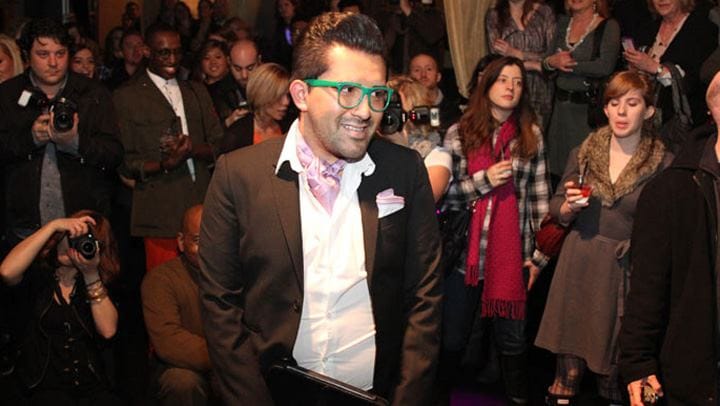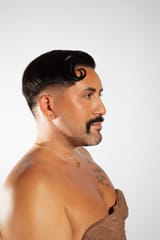FASHION SHOW FAILURE
Our goals don’t always work out the way we want them to, but that does not make us a failure.

This week’s column is about trusting the path you’re on.
It was 2007. After moonlighting as a nightlife promoter for a few months, I realized I would go broke if I didn’t find a solution fast. I was 20 years old, a full-time college student, volunteering at my school’s international business club, and barely making ends meet. It became obvious that promoting parties for straight people at straight clubs was not going to work.
I decided it would be best for me to approach the owner of the promoter group about launching an event specifically for the LGBTQ+ community. . I created my first-ever business proposal––a flimsy two-page document outlining how I would use the promoter’s resources to launch his company’s first Gay Night, and he would get 10% of all revenue generated from my new event.
My newly formed promoter group, “The GQ Boys” (so cringe) and I went on a tour of available clubs and settled on a Lincoln Park location because it was close enough to Chicago’s Boystown while allowing everyone to try somewhere new. The club gave us Sunday Night, which at the time was only popular for late-night industry types.
I called the party Sacred Sunday and decided we would launch a fashion show fundraiser for Autism Awareness Month. Because if there’s one thing about me, I’mma do the absolute most.
And the most I did. We convinced fashion company AKIRA to join us as the featured brand. I recruited dancers to offer choreographed moments in between dancing on gogo boxes, along with nearly 30 local models. One of my GQ Boys was a hairstylist and got his salon on board for hair and makeup. We got the ultimate music baddie, DJ Dani Deahl, to sign on. She was so talented and the coolest with her pink hair. Everything was coming together so quickly! I felt I was on a fast track to success.
I was so wrong. The entire event was a flop. Of course, my inner circle and some family came out to support, but overall the 500-person venue had about 45 attendees. Overrun with embarrassment and shame, I began taking shots and ordering doubles. (I’m not so proud of this part and do not encourage drinking on the job). I sat in the backroom holding back the tears as time ticked and I soon had to face everyone. The show must go on, after all.
I stumbled towards the main room, grabbed a mic, and got on the makeshift runway. I don’t remember everything I said, but do remember thanking everyone, making a few blunt-drunk jokes, talking about Autism Awareness Month, and introducing the show.
Not for nothing, the fashion show was absolutely spectacular. The combination of music, dancers, models, hair, makeup, and style transported everyone into the future of fashion. I remember thinking to myself that the show itself was worth the humiliation. The people who decided not to come were missing out, and everyone in the room was having a great time.
After the show, this tall, beautiful, Black man walked up to me and introduced himself as the creative director of a new and very popular boutique on Chicago’s westside. He said, "I can only imagine how you feel about the turnout, but I enjoyed what you had to say on the mic, and this fashion show tells me you had a vision. I would love to introduce you to the boutique owner and discuss producing our fashion shows."
As you can imagine, my jaw was on the ground, and I absolutely took that interview. The shop was named Bonnie & Clyde, a cutting-edge rebellious lifestyle boutique challenging the everyday midwest aesthetic of Chicago. They offered me a dual role as a personal shopper and event producer. Within the first year, I produced five high-profile fashion shows, including Christian Siranio’s first show since winning Project Runway. My whole career had changed through this experience.
This experience inspired me to start my first company, an event production business called Luxury Management with the mission of bringing luxury experiences to the masses through community-focused events. Soon after, I was on my way to New York Fashion Week with independently owned menswear brands J.Cheikh and Red Bull. Barely 21 years old, I was a successful small business owner working in two markets and on a fast track to success. And it all started with that silly two-page proposal.
The lesson in this is our goals don’t always work out the way we want them to, but that does not make us a failure. I know in my heart that everything works out as intended, even if we do not see the purpose in real-time. I could have chosen to give up on being a nightclub promoter, but I decided to challenge myself and launch my night for Queer people. I could have chosen not to face the crowd, but I took that stage. I could have chosen to hide in the back, but I stayed and connected with attendees. I took every opportunity that presented itself to keep moving forward, and the outcome led to me starting my first company. In conclusion, remember that when you choose to live fearlessly you are choosing limitless possibilities. You are keeping yourself open to all the world has to offer.
I want to hear from you. Do you have any examples of how something that initially seemed like a failure turned out to be a stepping stone? When was a time that you lived fearlessly? Email me at ricardo@queerency.com, and I may share your story in one of my next columns!"





